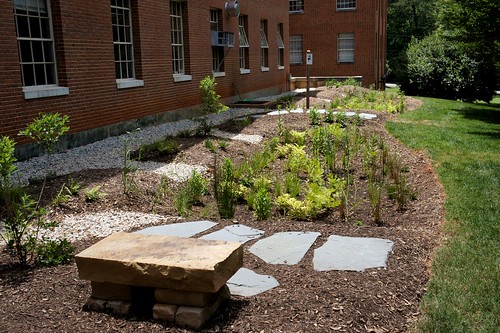Rain garden solves erosion problem

This spring Landscaping Services staff implemented an innovative solution to an erosion problem caused by copper runoff from the roof of Winston Hall. Runoff from copper rain gutters and roofs, commonplace across North Carolina, can be a source of soil contamination. The idea is simple. As stormwater washes off the copper roof, small traces of metal are carried along with the water into the soil. Since copper is a recognized biocide, copper-contaminated runoff can kill plants over time, contributing to soil erosion.
Some North Carolina institutions have chosen to scrap their copper gutters and replace them with other metals that leach “less harmful” agents. Landscaping Services Manager David Davis proposed a different solution to the copper runoff problem at Winston Hall: a rain garden.
The North Carolina Department of Environment and Natural Resources (NCDENR) created the Community Conservation Assistance Program (CCAP) to fund people and institutions with ideas that improve local water quality by reducing stormwater run-off and resultant erosion. Davis used funding from CCAP to subsidize installation of the rain garden. Landscaping Services also purchased recycled concrete aggregate, which was then buried in the path of the water. The copper ions in the water bind to the concrete rubble, effectively removing the contaminant from the water. The concrete aggregate replicates the effects of the many existing concrete storm drains around campus, which remove copper from stormwater runoff.
After laying the concrete aggregate, Davis and his team filled in the area with indigenous plants like Paw-Paw, Spice Bushes, and Black-Eyed Susans to further prevent erosion and take up the clean water.
The native plants in the rain garden also serve as invaluable habitat for migrating Monarch butterflies. The rain garden is now a certified Monarch Waystation.
Since Winston Hall is home to the university’s Biology Department and Environmental Program, this garden will also provide a useful outdoor laboratory for biology and environmental science students in Winston Hall. Professors from the Biology Department have already expressed interest in mapping the site and charting its growth, as part of their curriculum.
By Joey DeRosa, Communications and Outreach Intern
